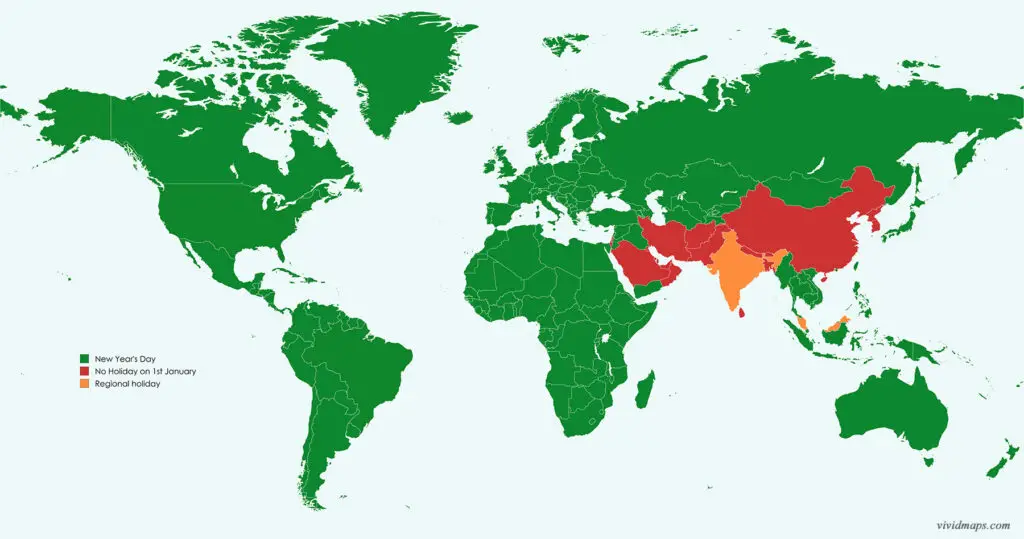Countries Where New Year’s Day Is Not a Public Holiday
New Year’s Day, celebrated on January 1, is one of the most recognized holidays worldwide. However, not every country considers this date a public holiday. Some nations follow unique cultural or religious calendars, making January 1 an ordinary working day. To highlight this variation, we’ve created a world map showing these countries and others with regional celebrations of New Year’s Day.

Why January 1 Isn’t a Holiday Everywhere
The reasons for not observing January 1 as a public holiday vary significantly, often rooted in the traditions and calendars of these nations:
- Saudi Arabia and Afghanistan: These countries follow the Islamic (Hijri) lunar calendar, where the New Year falls on a different date each year. Public holidays are mainly tied to Islamic festivals like Eid al-Fitr and Eid al-Adha.
- Iran: Here, the New Year, called Nowruz, is celebrated on March 20 or 21, coinciding with the spring equinox. It’s a deeply ingrained cultural celebration with over 3,000 years of history.
- India: While January 1 is celebrated in urban centers and recognized in some states like Tamil Nadu and West Bengal, most Indian states prioritize regional New Year’s festivals like Ugadi (Karnataka, Andhra Pradesh) and Vishu (Kerala), which align with their traditional calendars.
- China: Though January 1 is an official holiday, the major New Year’s celebration is the Lunar New Year, which falls in late January or February and is celebrated for up to 15 days.
Interestingly, the distribution of countries that don’t recognize January 1 as a public holiday is similar to that of those that don’t celebrate Christmas.
Interesting Facts About New Year’s Day
New Year’s celebrations vary widely across the globe, shaped by historical and cultural traditions. Here are some intriguing facts:
- The First January 1 Celebration: In 45 BC, Julius Caesar introduced the Julian calendar, aligning the New Year with January 1 for the first time.
- England’s Changing Date: Before adopting the Gregorian calendar in 1752, England marked the New Year on March 25. Scotland made the switch to January 1 much earlier, in 1600.
- ‘Auld Lang Syne’ in the Maldives: The national anthem of the Maldives was sung to the melody of ‘Auld Lang Syne’ until 1972.
- Italy’s Lucky Underwear: Italians wear red underwear on January 1, a custom from medieval times believed to bring good fortune for the year ahead.
- Racehorse Birthdays: In the Northern Hemisphere, every racehorse celebrates its official birthday on January 1 for ease in age classification.
- Vietnam’s Tet Festival: While Vietnam has begun observing January 1 as a public holiday, the Tet Festival, or Vietnamese Lunar New Year, remains the primary celebration.
- Nepal’s Unique Calendar: Nepal marks its New Year in mid-April, following the Bikram Sambat calendar.
- Global Food Traditions: From Spain’s midnight tradition of eating 12 grapes to Brazil’s lentils symbolizing prosperity, food plays a central role in welcoming the New Year worldwide.
These varied customs demonstrate the rich diversity of traditions tied to the concept of a new year, shaped by local history and culture.
If you’re fascinated by global cultural differences, consider adding a detailed world map to your home or office. High-quality maps are an excellent tool for learning about history, geography, and cultural differences. Here are some beautiful, informative world map posters available on Amazon:
- National Geographic World Map – A classic map with detailed geography and political boundaries.
- Scratch-Off World Map – Perfect for tracking your travels and learning about the world.
- Antique-Style World Map – A decorative map ideal for history enthusiasts.
Have you experienced a unique New Year’s celebration from another culture? Or do you have a family tradition that differs from the standard January 1st observance? We’d be curious to hear about your experiences in the comments below.








